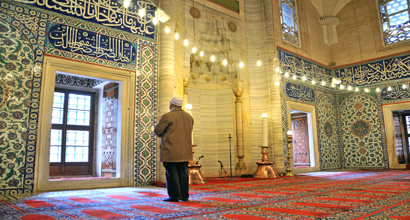Originally posted 2024-04-01 13:31:32.
1. Prayer and the Recognition of Weakness
Standing before Allah in prayer allows a person to recognize their inherent weakness. This self-awareness helps to alleviate fear and negative emotions. Allah promises relief and comfort for those who engage in prayer, as stated in the Qur’an:
“Those who believe, do good deeds, keep up the prayer, and pay the prescribed alms will have their reward with their Lord: no fear for them, nor will they grieve.”
— (Al-Baqarah 2:277)
2. Prayer as a Cure for Anger and Emotional Turmoil
Prayer serves as an antidote to anger and frustration. It teaches the believer patience, silence, and surrender to Allah, allowing them to regain control over their emotions. The peace achieved through prayer is further enhanced by khushu`, or humility and submission, which increases concentration and mental clarity during prayer. Allah commands us to offer our prayers with this submissiveness, saying:
“Certainly, will the believers have succeeded. They who are during their prayer humbly submissive.”
— (Al-Mu’minun 23:1-2)
3. Scientific Studies on the Psychological Impact of Prayer
Several scientific studies highlight the therapeutic benefits of prayer, including its role in alleviating anxiety and depression:
-
Study in Malaysia: Research in Malaysia showed that patients with religious backgrounds benefitted significantly from religious psychotherapy (including prayer) in addition to medical treatment.
-
A Study from Aachen University, Germany: This study found that multitasking increases cognitive load, leading to fatigue and errors. The solution? Submission, which is practiced in prayer. If we take time each day to engage in “reverence sport” (i.e., focusing on prayer), it can improve our ability to manage life’s difficulties.
-
Dr. Hossam Ar-Rawi’s Observation: According to Dr. Ar-Rawi, the silent supplication during prayer provides the highest form of relaxation, superior to any other relaxation method used to relieve nervous tension.
4. Prayer as a Healing for Disasters and Physical Relief
Prayer also has a physical component that benefits the body. Dr. Tedues Costropala, a psychiatrist, recommends simple exercises for those suffering from depression. These exercises improve blood circulation and oxygen supply to the brain. This mirrors the physical movements during prayer, which increase blood flow and contribute to overall well-being. The Prophet Muhammad (peace be upon him) would turn to prayer in times of difficulty, using it as a refuge when faced with hardship. As narrated:
“When anything big happened to the Messenger of Allah (peace be upon him) or anything concerned him, he would seek refuge in the Prayer.”
— (Ahmad)
5. Prayer: Tranquility and Prevention
Dr. Tomas Hayslop, after years of experience, states that prayer is the most effective means of achieving tranquility and calmness. It is not merely a remedy for emotional distress but a preventative measure against psychological diseases. Allah reassures the believer of the peace that comes from remembrance:
“Unquestionably, by the remembrance of Allah, hearts are assured.”
— (Ar-Ra`d 13:28)
Thus, the regular practice of prayer acts as both a therapeutic and preventive measure against mental and emotional turmoil.
6. Prayer as a Daily Source of Comfort
Prayer, prescribed five times daily, ensures that the believer receives comfort at fixed times throughout the day. This regular connection with Allah acts as a shield against psychological stress. The Prophet Muhammad (peace be upon him) expressed this deep need for prayer when he said to Bilal:
“Give us comfort by it, O Bilal.”
— (Abu Dawud)
Indeed, prayer is a source of comfort, and we should strive to follow the example of the Prophet (peace be upon him), making prayer a means of solace and spiritual nourishment in our lives.
Conclusion: Prayer as a Healing and Source of Comfort
The psychological, emotional, and spiritual benefits of prayer are profound. It is a source of strength, tranquility, and healing. From relieving anxiety and stress to providing physical benefits through its postures, prayer is a complete system of well-being for the body, mind, and soul. By practicing prayer with mindfulness and submission (khushu`), we align ourselves with the peace and comfort that it offers. In this way, prayer not only becomes a means to communicate with Allah but also a tool for personal healing and emotional resilience.
Let this reflection remind us of the immense value of prayer, not just as an act of worship but as a deeply therapeutic practice that supports us through life’s challenges.
______________________________________________
Source: Translated and adapted from Al-Alukah website.
 Arabic
Arabic English
English


